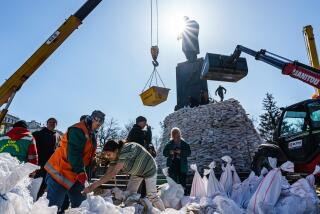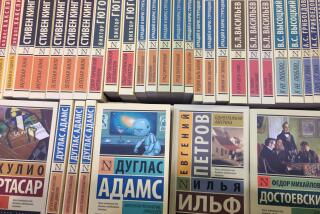The Past Has a Strong Effect on Soviet Policy
- Share via
Nobel laureate Lawrence R. Klein presents a stimulating interpretation of Soviet motives in his article “Understanding the Russian Psyche” (Times Board of Economists, Nov. 5). The fears of Muscovites after the 17th-Century Polish invasion, which he describes, have been borne out since that time: The Swedish incursion in the 18th Century, Napoleon in the 19th Century and the Kaiser and Hitler in the 20th Century.
Furthermore, after World War I, Japan and the Western powers intervened in the Russian civil War and imposed a blockade that caused millions of deaths by famine and pestilence before the conscience of ordinary citizens was aroused and relief efforts (by other nations) were mounted. Against all these attacks, Russian governments have survived by trading space for time, and the possession of an immensity of land is engraved on the Russian mind as indispensable to continued existence as a nation.
There is another side to this, however. The military-industrial-security complex of the Russian empire--both Czarist and Soviet brands--has always profited from the defensive fears of the populace, well-grounded though these may be. It is by keeping those fears alive by one threat of “encirclement” after another that the bureaucratic state machine has been able to justify its dominance. Whatever general economic advantages might accrue from a reduction in military spending will inevitably be weighed against the power elite’s stake in its continuation at a high level.
It must be remembered that the Russians--and Ukrainians and other minority groups--have suffered immensely not only from foreign invaders but also from their own rulers. Names like Ivan the Terrible (16th Century) and Josef Stalin remind us that the Russian state has been perpetually at war with its own subjects. Behind its Marxist facade (which Klein wisely discounts) the present regime is also engaged in a titanic class struggle--hence all the current attention to “labor discipline” in the Soviet press. The tensions within will always have significant repercussions on Russian policies abroad.
How the Soviet leadership will approach any international political conference is the resultant of a very complex summation of political, economic and social forces. The historical attitudes that Klein emphasizes are important, but the internal stresses both within the ruling class and between rulers must also not be ignored.
GILBERT DEWART
Pasadena
More to Read
Sign up for Essential California
The most important California stories and recommendations in your inbox every morning.
You may occasionally receive promotional content from the Los Angeles Times.













